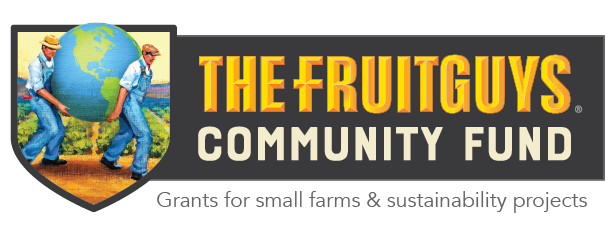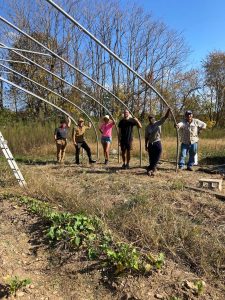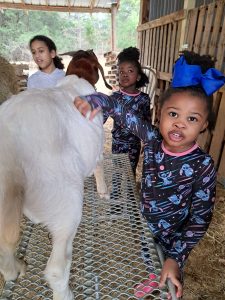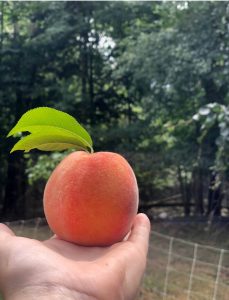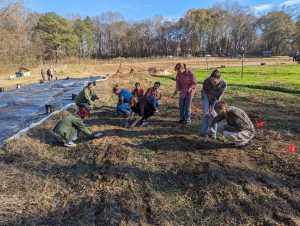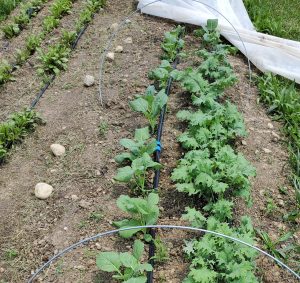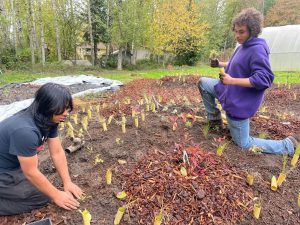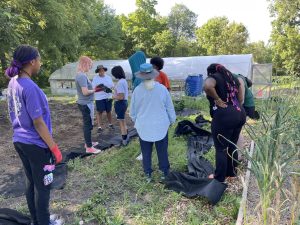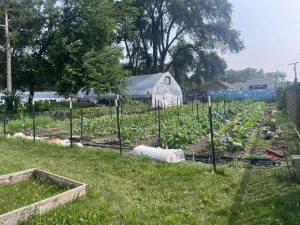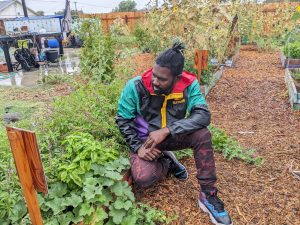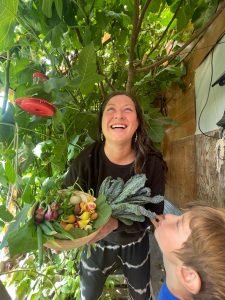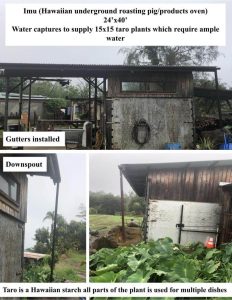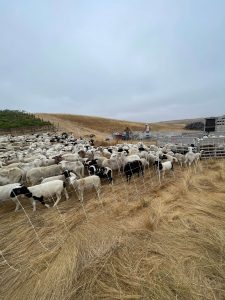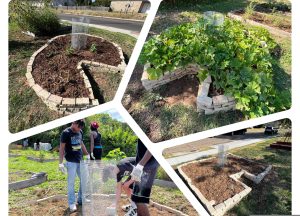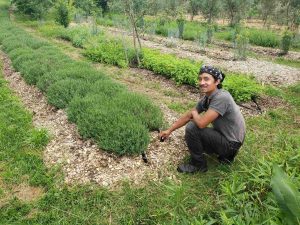In 2023, The FruitGuys Community Fund awarded our largest class of farm grantees so far: 18 small-scale farms and agricultural non-profits were awarded a total of $83,757 in grant awards for projects impacting water conservation, energy efficiency, biodiversity, pollination, seed preservation, and ecological land management. The majority of funds were directed to farmers of color, LGBTQ farmers, women farmers, and beginning farmers in an effort to provide critical support to under-represented farmers and communities that have been historically marginalized. Our total awards grew by more than 17% from 2022 and we extended our regional impact to support farms for the first time in Mississippi, Tennessee, and Kentucky.
 The 2023 grant awards were made possible thanks to donors to our Small Farms, Big Impacts campaign, a grant from National Philanthropic Trust, and continued program support from major donor, Aramark. Aramark, the Philadelphia-based food and facilities service provider, began a three-year commitment in 2022 to funding at least ten nonprofit farms led by Black, Indigenous, and People of Color (BIPOC) The FruitGuys covers all administrative and staffing costs of the Community Fund in addition to contributing to the annual grant budget.
The 2023 grant awards were made possible thanks to donors to our Small Farms, Big Impacts campaign, a grant from National Philanthropic Trust, and continued program support from major donor, Aramark. Aramark, the Philadelphia-based food and facilities service provider, began a three-year commitment in 2022 to funding at least ten nonprofit farms led by Black, Indigenous, and People of Color (BIPOC) The FruitGuys covers all administrative and staffing costs of the Community Fund in addition to contributing to the annual grant budget.
We’ve received final project updates from the 2023 farm grantees. Enjoy the stories of their successes and challenges achieving their project plans.
Final 2023 Project Updates
is a 27-acre, fifth-generation, multi-generational farm in Richmond, Kentucky that grows fruit, berries, vegetables, herbs, and seeds. Farmer Jim Embry is a noted permaculture expert, Slow Food proponent, and was named a 2023 James Beard Foundation Leadership Award Winner. They received a $4,996 grant to purchase varieties of native pollinator plants, heirloom vegetable and culturally-relevant seeds, two bat boxes for natural pest control, three additional beehives and a bee nuc to expand their honey production, and install a combined solar and wind generating system to provide power for the micro-irrigation system in their high tunnel.
Farmer Jim Embry reported that despite a severe hail storm in June that damaged crops, fruit trees, buildings, and equipment, they were able to successfully complete their grant project.
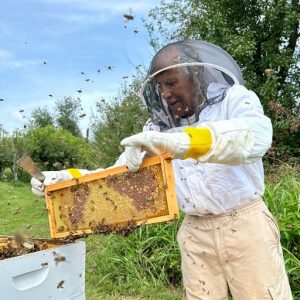
“This FruitGuys Community Fund grant is an absolute blessing that allows small operations such as our farm to add to the dimensions of our work. So, we now have additional equipment, materials, seeds, bees and hives, all of which are climate smart agriculture practices that add to the work already in place on our farm.”
is a 10-acre, woman-of-color-run farm in Damascus, MD that grows vegetables and flowers of primarily African heritage heirloom varieties. Founder and Farm Manager Nia Nyamweya is regenerating land that had been in corn and soybean production. They received a $5,000 grant to purchase a high tunnel to extend their growing season and install a rainwater catchment and drip irrigation system.
Founder & Farm Manager Nia Nyamwea told us that instead of buying a new high tunnel and having it shipped to the farm, they opted to purchase a 30’x96’ foot high tunnel that was previously used by another local farmer. While the additional work of disassembling and assembling the structure was challenging, Nia reported community involvement with her project that increased engagement.
“We have now completed assembling the high tunnel, and intend to use it for rain collection this 2024 growing season. As a result of completing our high tunnel in the fall 2023, we were able to extend our growing season into December 2023 and January 2024. This increased our food production capacity and as a result we were able to provide collards, kale, radishes through December 2023, and have garlic and spinach planted for an early spring 2024 harvest. All of the extra food produced is provided to local food banks/distributors to increase food access for low-income families. [This increased capacity] helped us to secure a long-term lease of 10 years with an option to extend for 5 additional years.”
is a 7-acre, multi-generational, family-owned and operated meat goat farm in Starkville, Mississippi. Co-owner, Elmarie Brooks, is the only African American female goat farmer in the area. Brooks’ Family Farm uses minimal amounts of purchased feed and instead primarily pastures (allows to graze) their Nubian and Boer goats. They received a $5,000 grant to upgrade their barn facilities with essential equipment and supplies such as a livestock shearing and trimming stand, freestanding corrals, and a scale, as well as essential signage and supplies for group visits and farm tours.
Farmer manager Elmarie Brooks reported that in addition to the purchase and installation of their new equipment, they hosted an 8-week class on “Improving Results on Farms & Ranches with Holistic Management” that was attended by a number of local farmers. They also hosted a local Girl Scout troop where kids could experience goat hoof trimming, body conditioning checks, and feeding.
“This funding opportunity allowed an opportunity to bridge some racial gaps in the community by allowing a Dialogue Group to attend field day on the Farm. Thank you so much for this opportunity. It has made a tremendous improvement in Brooks Family Farm that will sustain the farm for many years to come.”
is a 84-acre, non-profit farm based in Sterling, Connecticut that provides access to farm-based therapies for veterans and first responders suffering from service-related disabilities such as PTSD, as well as educational mentorship for at-risk youth in both Connecticut and Rhode Island. With their $5,000 grant, they improved their pollination program by purchasing five new colonies of honeybees and establishing an edible pollinator hedgerow filled with flowering plants, trees, and shrubs that will support pollinators year-round, as well as provide crops.
The honeybee colonies are now established in their hives and ContemPLATE has already enjoyed their first honey harvest. The pollinator plantings are in the ground and they are looking forward to harvests of fruit and nuts as the flowering trees grow and establish themselves. Their youth members, “are interested in the bees and have geared up in mini bee suits to check out the hives! Such a great experience to witness,” said Ryan Salvas, project manager.
is a 22-acre community urban farm located in Chattanooga, Tennessee that is committed to food access, education, and sustainable agriculture. The farm connects farmers with tools, resources, and people to build successful farm businesses. They received a $4,521 grant to expand no-till growing areas for both perennial and annual plants that will maximize the amount of food grown and available to community members and create new habitat for pollinators. Working together with students from the University of Tennessee Chattanooga students from the Regenerative Agriculture Design Class, Crabtree Farms successfully designed, planned and implemented an expanded community garden that will benefit the whole neighborhood for years to come. They were able to mitigate drainage issues in a low-lying area of the farm through contour design and creation of new berm and swales.
The goal of this project was to increase the amount of shared food sources and growing spaces available to Crabtree Community Gardeners with an installation featuring sustainable growing systems and collaborative design,” said Lena Banks, Director of Development & Communications. “At the completion of the installation, over 29 new varieties of plants were added to the community gardening space. These predominantly native plants have either human food/medicinal use or a feature that supports the overall polyculture system.”
is a 1-acre, woman-of-color-run farm in Dayton, Ohio that uses regenerative practices to grow squash, tomatoes, greens (collards, mustard, kale), onions, peppers, okra, swiss chard, green beans, and cucumbers. Farm owner Donnetta Boykin sells her produce through direct sales, wholesalers, and farmers’ markets, in addition to donating to food pantries. They received a $5,000 grant to purchase equipment to transition growing areas to low/no-till and to add a cold storage unit to allow for proper storage of harvested crops.
Owner Donnetta Boykin reported that after challenges sourcing the right size of cold storage unit that fit their budget, they were able to cut down on spoiled produce and participate in new wholesale opportunities. They are also using the cold storage to support a new seed saving/seed library project.
(GRuB) is a 3-acre, non-profit farm in Olympia, Washington that offers hands-on outdoor education and employment programming support for youth, ages 16-24, who have left high school before graduating. They are the only program of its kind in a five-county region. Food donations are their primary crop distribution. They received a $4,910 grant to expand their perennial berry production and improve weed management.
More than 30 youth participated over three seasons to plan, create, and plant a space to grow perennial native berries, including blueberries, Evergreen Huckleberry, and cranberries. They also successfully experimented with a weed steamer to kill noxious weeds and compost them, improving soil health and reducing removal costs.
“We are SO excited to watch the efforts of our work grow and blossom and fruit for many years to come, and we couldn’t have done it without your support for this amazing project!” reported Clare Follmann, grants coordinator. “Short-term, this project improved our noxious weed management. … More long-term benefits we have already begun to see include reduced tillage, restored habitat, and increased access to fresh berries for our community by working in concert with our farm’s natural ecology.”
is a 1.5-acre, non-profit farm in Kansas City, Missouri that produces and distributes free organic vegetables to seniors, veterans, and low-income families with the goal of raising health levels throughout Kansas City. Their team converts unused urban land into sustainable organic community vegetable gardens. They received a $3,100 grant to purchase an array of supplies and equipment including seeds, soil, mulch, and germination trays, and to expand production an additional 10,000 square feet.
“One of our main challenges was keeping vegetables available for the high demand of low income residents in need,” said cofounder Anthony Nealy. Their grant allowed them to successfully expand their garden site and production to produce thousands of pounds of produce which they distribute for free to local food-insecure residents.
is a 2-acre, non-profit farm in Ypsilanti, Michigan that offers educational programs for gardeners of all ages and levels. Produce grown is sold at their farmer’s markets and donated to their program participants and local food pantries. They received a $3,782 grant to develop a new growing space and market garden with the purchase of caterpillar tunnels, seeds, a water cistern, harvesting bins, garden carts and more.
A “sun garden” market garden space was created by removing grass, tilling the soil, and planting seedlings. A caterpillar tunnel was installed to extend the growing season.“This project has allowed us to expand the amount of produce we grow and share with the community exponentially while also creating new space for educational opportunities such as tours, workshops, and internships,” reported Julius Buzzard, executive director. “During the winter, we brought on a seeding intern and a market gardening and compost intern during the growing season. This growing space allowed us to grow enough produce to launch a pay-what-you-can CSA called Solidarity Shares. We prioritized low-income households in our community who have felt the most damaging impacts of an unjust food system.”
is an agricultural non-profit that operates Ridgecrest Community Garden on less than an acre in Ridgecrest, CA. The garden is volunteer-run and provides fresh organic produce, education, and a space for healing and positive social engagement for many low-income families in a neighborhood that lacks easy access to healthy foods. With their $3,672 grant they purchased and installed a solar-powered automatic irrigation system to efficiently water up to 50 raised beds and several fruit trees. They will also use funds to purchase fifteen flowering trees that will serve as wind-breaks that protect nearby plants and crops as well as increase biodiversity at the community garden site.
Holistic Diving Innovations has already begun seeing the benefits of their project. President Tyrone Ledford told us they “were able to install an efficient watering system that saved 30% water use over the peak summer and fall seasons.” In the long term, the trees will provide shade and serve as a windbreak, protecting planting during windy seasons.
is a 35-acre, off-grid organic farm and animal sanctuary in Antonito, CO that uses biodynamic and permaculture-based agriculture practices such as drought tolerant plantings that enhance biodiversity, cover cropping, and rotational grazing. With their $4,980 grant they purchased and installed a solar-powered water pump and drip irrigation system for their growing spaces. Replacing a fossil fuel generator that operated their well pump in an effort to conserve water and run a more efficient system with a renewable energy source.
Since installing the solar-powered water pump and drip irrigation system they’ve seen their winter crop yields go up and water usage go down. Farm co-owner, Morgan Velasquez told us “we were able to install an automatic drip that operates at night using batteries and charges with the sun. We lost much less water to evaporation and conserved our water resources.” In addition, the farm created informational PDF and documented their journey through youtube and on social media for those looking for information, inspiration or thoughts on troubleshooting or switching to the solar-powered watering system.
is a 2-acre agricultural nonprofit in Kapaau, HI. Their farming programs produce taro, red and green onion, long beans, kale, cabbage, eggplant, okra, tomatoes, spices, medicinal herbs, and cut flowers. In addition, they raise pigs, chickens, and rabbits for meat and eggs. They distribute food amongst vulnerable communities and food banks in the area. Kahua Pa’a Mua provides resources for families to grow their own food and nurtures agricultural entrepreneurship and primarily serves youth and adults of Hawaiian ancestry. With their $5,000 they obtained the necessary materials to construct a water catchment system to supply water to 3 main areas of their farm.
Program Manager, Carol Fuertes, reported, “we were able to utilize a gutter system for water catchment. Supplying water to 3 main areas of our developing farm. A vegetable garden, flower beds, and animals. This system will save on water costs, over $400 monthly from the County water system, and provide a more stable crop production during times of drought.”
is a 70-acre farm and pasture in Rumsey, CA that grows table grapes and raises meat ducks and sheep, in addition to specializing in regenerative grazing services. They bring their sheep to graze farms, vineyards, and orchards throughout northern California to reduce wildfire fuel and naturally re-propagate native grasses and reduce invasive plant species, which also improves soil health without herbicides, tillage, or irrigation. With their $4,750 grant they purchased a portable corral system to allow them to reach a greater number of clients in the northern California grasslands community.
With the addition of a portable corral system they are now able to “smoothly and successfully haul 1,600 sheep to over 30+ sites around California” reported owner, Shannon Waldron. Increasing the reach of their regenerative grazing services is important and impactful to supporting sustainable land management and contributing to environmental conservation.
is a 7-acre farm in Selma, IN that grows around 20 different fruits and vegetables using organic practices, in addition to raising pasture-fed goats, chickens, and turkeys. Farmers Sylvester and Sabrina Friend have partnered with local schools, youth groups, and agricultural organizations to share their gardening and farming knowledge with the community. With their $4,945 grant they were able to extend their growing season by constructing hoop houses on their raised planting beds, reduce water usage by installing a rain catchment and drip irrigation system, and purchase gardening tools and supplies for a youth farming program.
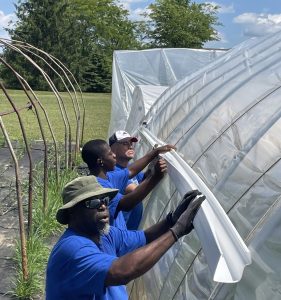
By adding the rainwater catchment system, they were able to collect about 1000 gallons of water in a season during a drought year. The drip irrigation system will continue to save them about 100 hours of labor over a growing season. Farmer Sylvester Friend said, “the farm will continue to have positive impacts regeneratively collecting rainwater, reducing the wasted water by utilizing drip, and extending our growing season…We have the appropriate tools and safety equipment when volunteers and youth groups come to the farm to learn”
is a 1-acre urban agricultural nonprofit in Waco, TX that connects the local community, especially youth, with the power of growing their own food. The farm produces crops such as okra, mixed herbs, tomatoes, peppers, sweet potatoes, bok choy, broccoli, onions, collards, peas, and melons. With their $4,339 grant they were able to nurture local youth through the planning, installation, planting, and harvesting of four keyhole gardens. Keyhole gardens are a sustainable farming system originally developed in Africa that allows for growing in small spaces. Each round garden has a walk-in notch for access and a compost pit in the center that nourishes the plants.
Farmers LaTrael & Chisa Brigham reported that “the youth completed the project! All participants are more aware of the keyhole garden concept and now have the skills to replicate it for their personal or public use.” The youth also experienced the support of their community in this process by growing and harvesting pumpkins and were able to sell them to a local florist for Thanksgiving arrangements and the community came out and purchased them, ensuring resources for the next growing season and establishing a relationship with other business owners.
is a 1-acre, nonprofit urban farm and community garden in Long Beach, CA that grows organic produce, employs transition-age people with disabilities and fosters youth (ages 18-22) through a job-readiness program. They also host free gardening workshops for the community. With their $4,762 grant they built six more planter boxes to grow food for local residents. They also purchased fruit trees and supplies to complete an expanded pollinator garden.
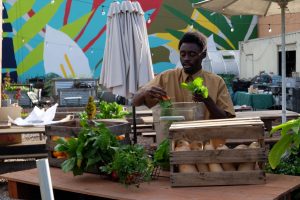
Despite some staffing challenges, Sowing Seeds was able to successfully complete the build of new planter boxes and expand pollinator habitat on the farm site. Dina Feldman, Director of Operations reported, “we’ve seen an increase in the amount of pollinator activity at the farm. The continued growth and expansion of our planter boxes will help us to continue to provide local organic food to the community, in addition to providing vocational training to marginalized youth in our community.”
is an 11-acre, nonprofit farm and permaculture education center in West Edmeston, NY dedicated to providing education and training in sustainable agriculture and providing access to fresh produce for low-income and low-access communities. Their off-the-grid center grows 200+ varieties of annual and perennial cold-hardy fruits, vegetables, mushrooms, and herbs. With their $5,000 grant they converted their existing solar-powered irrigation system from overhead sprinklers to drip irrigation.
Unadilla Community Farm’s water-saving drip irrigation system was successfully installed and is now in operation. “Positive outcomes of this project are already being measured, as the amount of staff hours spent managing the farm’s irrigation system has dropped dramatically — from an estimated 3 hours per day spent maneuvering the old overhead irrigation system, to 1 hour per week spent cleaning the filter, inspecting drip lines, and adjusting timer valves as needed,” said Board President Greta Zarro.
We Have Always Been Related (WHABR)
is a 1-acre, non-profit farming collective in Milwaukee, WI. WHABR collective member, Chalchiuhkoatl Kardós, described the farm as, “an intentional intergenerational collective of two-spirit, queer, trans, nonbinary and gender expansive (2SQTNBGE) BIPOC earthworkers villaging up to take care of one another and reclaim, remember, and regenerate our traditional roles, responsibilities, knowledges, visions, and medicines within our communities.” Their work is rooted in regenerative practices such as restoring soil health and ancestral knowledge and wisdom to steward the land. With their $4,999 grant they will purchase a variety of supplies and equipment such as compost, a soil PH meter, straw, rice hulls. They also were able to provide seven low-income, 2SQTNBGE BIPOC families a full season’s share in their CSA program, which included four farm visits and two community meals prepared by one of their member chefs with ingredients sourced from the farm.
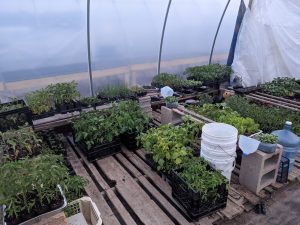
They distributed a full season’s CSA to seven families and hosted them on the farm throughout the growing season. They have been granted a project extension through September 2024 in order to spend their remaining funds on necessary supplies for an upcoming participatory workshop on microorganisms and organic biofertilizer benefits during the next warm season.
Help More Farms in 2024!
Gifts of any amount help us fund grants for more small farms and boost sustainable agriculture. All donations are 100% tax-deductible and go directly to the grants, not administrative costs. Donate today!
